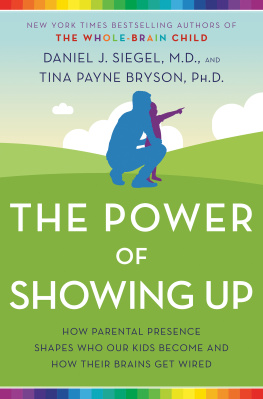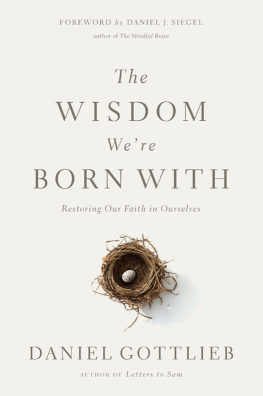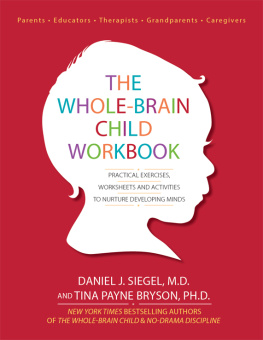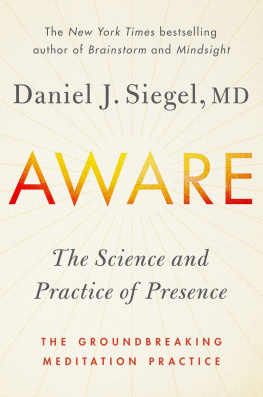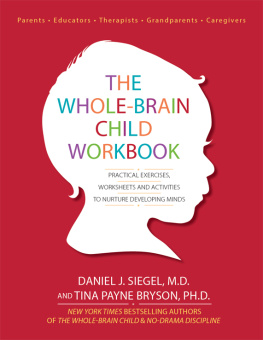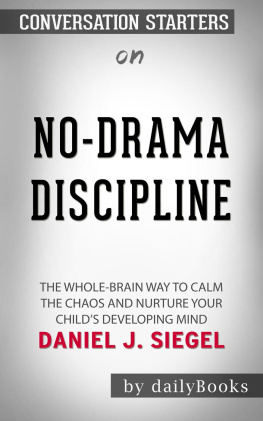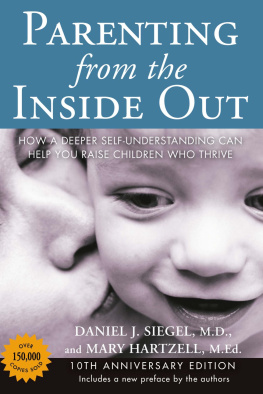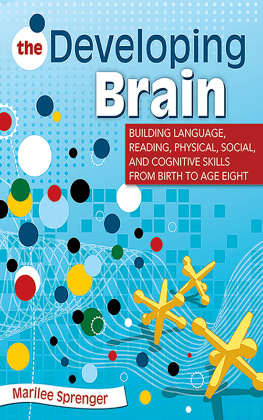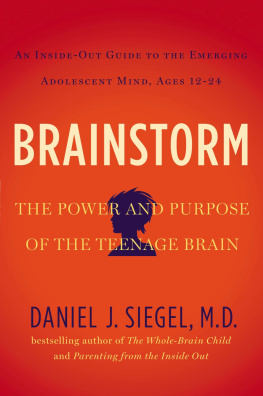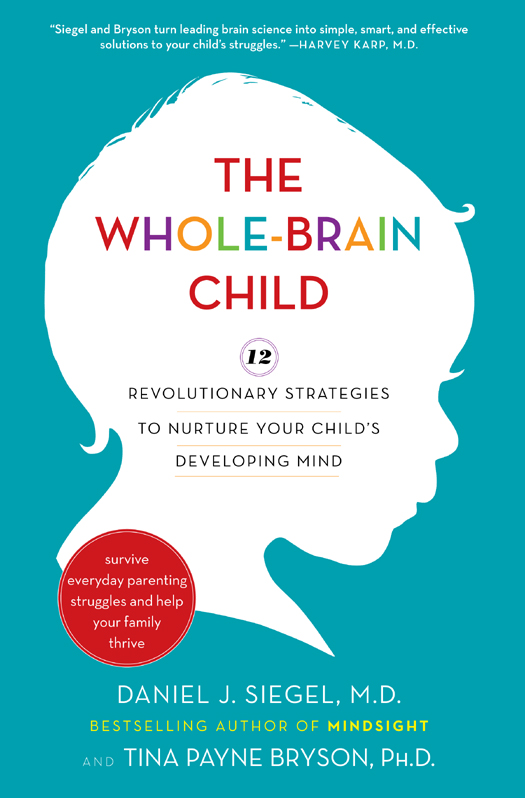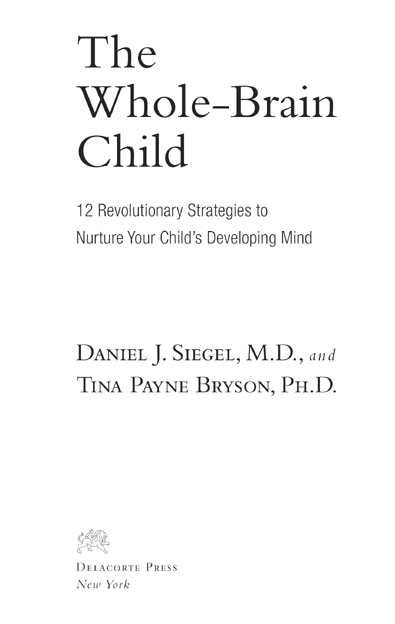All identifying details, including names, have been changed except for those pertaining to the authors family members. This book is not intended as a substitute for advice from a trained professional.
Copyright 2011 by Mind Your Brain, Inc., and Bryson Creative Productions, Inc.
All rights reserved.
Published in the United States by Delacorte Press, an imprint of The Random House Publishing Group, a division of Random House, Inc., New York.
D ELACORTE and colophon are registered trademarks of Random House, Inc.
LIBRARY OF CONGRESS CATALOGING-IN-PUBLICATION DATA
Siegel, Daniel J.
The whole-brain child : 12 revolutionary strategies to nurture your childs developing mind / Daniel J. Siegel, Tina Payne Bryson.
p. cm.
eISBN: 978-0-553-90725-4
1. Parenting. 2. Child development. 3. Child rearing.
I. Bryson, Tina Payne. II. Title.
HQ755.8.S53123 2011
649.1019dc22 2010052988
Illustrations by Tuesday Mourning
Jacket design: Misa Erder
v3.1_r2
Contents
INTRODUCTION:
Survive and Thrive
Youve had those days, right? When the sleep deprivation, the muddy cleats, the peanut butter on the new jacket, the homework battles, the Play-Doh in your computer keyboard, and the refrains of She started it! leave you counting the minutes until bedtime. On these days, when you (again?!!) have to pry a raisin from a nostril, it seems like the most you can hope for is to survive.
However, when it comes to your children, youre aiming a lot higher than mere survival. Of course you want to get through those difficult tantrum-in-the-restaurant moments. But whether youre a parent or other committed caregiver in a childs life, your ultimate goal is to raise kids in a way that lets them thrive. You want them to enjoy meaningful relationships, be caring and compassionate, do well in school, work hard and be responsible, and feel good about who they are.
Survive. Thrive.
Weve met with thousands of parents over the years. When we ask them what matters most to them, versions of these two goals almost always top the list. They want to survive difficult parenting moments, and they want their kids and their family to thrive. As parents ourselves, we share these same goals for our own families. In our nobler, calmer, saner moments, we care about nurturing our kids minds, increasing their sense of wonder, and helping them reach their potential in all aspects of life. But in the more frantic, stressful, bribe-the-toddler-into-the-car-seat-so-we-can-rush-to-the-soccer-game moments, sometimes all we can hope for is to avoid yelling or hearing someone say, Youre so mean!
Take a moment and ask yourself: What do you really want for your children? What qualities do you hope they develop and take into their adult lives? Most likely you want them to be happy, independent, and successful. You want them to enjoy fulfilling relationships and live a life full of meaning and purpose. Now think about what percentage of your time you spend intentionally developing these qualities in your children. If youre like most parents, you worry that you spend too much time just trying to get through the day (and sometimes the next five minutes) and not enough time creating experiences that help your children thrive, both today and in the future.
You might even measure yourself against some sort of perfect parent who never struggles to survive, who seemingly spends every waking second helping her children thrive. You know, the PTA president who cooks organic, well-balanced meals while reading to her kids in Latin about the importance of helping others, then escorts them to the art museum in the hybrid that plays classical music and mists lavender aromatherapy through the air-conditioning vents. None of us can match up to this imaginary superparent. Especially when we feel like a large percentage of our days are spent in full-blown survival mode, where we find ourselves wild-eyed and red-faced at the end of a birthday party, shouting, If theres one more argument over that bow and arrow, nobodys getting any presents!
If any of this sounds familiar, weve got great news for you: the moments you are just trying to survive are actually opportunities to help your child thrive. At times you may feel that the loving, important moments (like having a meaningful conversation about compassion or character) are separate from the parenting challenges (like fighting another homework battle or dealing with another meltdown). But they are not separate at all. When your child is disrespectful and talks back to you, when you are asked to come in for a meeting with the principal, when you find crayon scribbles all over your wall: these are survive moments, no question about it. But at the same time, they are opportunitieseven giftsbecause a survive moment is also a thrive moment, where the important, meaningful work of parenting takes place.
For example, think about a situation you often just try to get through. Maybe when your kids are fighting with each other for the third time within three minutes. (Not too hard to imagine, is it?) Instead of just breaking up the fight and sending the sparring siblings to different rooms, you can use the argument as an opportunity for teaching: about reflective listening and hearing another persons point of view; about clearly and respectfully communicating your own desires; about compromise, sacrifice, negotiation, and forgiveness. We know: it sounds hard to imagine in the heat of the moment. But when you understand a little bit about your childrens emotional needs and mental states, you can create this kind of positive outcomeeven without United Nations peacekeeping forces.
Theres nothing wrong with separating your kids when theyre fighting. Its a good survival technique, and in certain situations it may be the best solution. But often we can do better than just ending the conflict and noise. We can transform the experience into one that develops not only each childs brain but also her relationship skills and her character. Over time, the siblings will each continue to grow and become more proficient at handling conflict without parental guidance. This will be just one of the many ways you can help them thrive.
Whats great about this survive-and-thrive approach is that you dont have to try to carve out special time to help your children thrive. You can use all of the interactions you sharethe stressful, angry ones as well as the miraculous, adorable onesas opportunities to help them become the responsible, caring, capable people you want them to be. Thats what this book is about: using those everyday moments with your kids to help them reach their true potential. The following pages offer an antidote to parenting and academic approaches that overemphasize achievement and perfection at any cost. Well focus instead on ways you can help your kids be more themselves, more at ease in the world, filled with more resilience and strength. How do you do that? Our answer is simple: you need to understand some basics about the young brain that you are helping to grow and develop. Thats what



